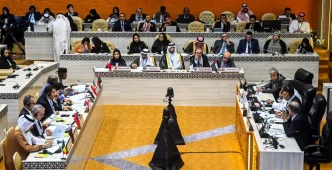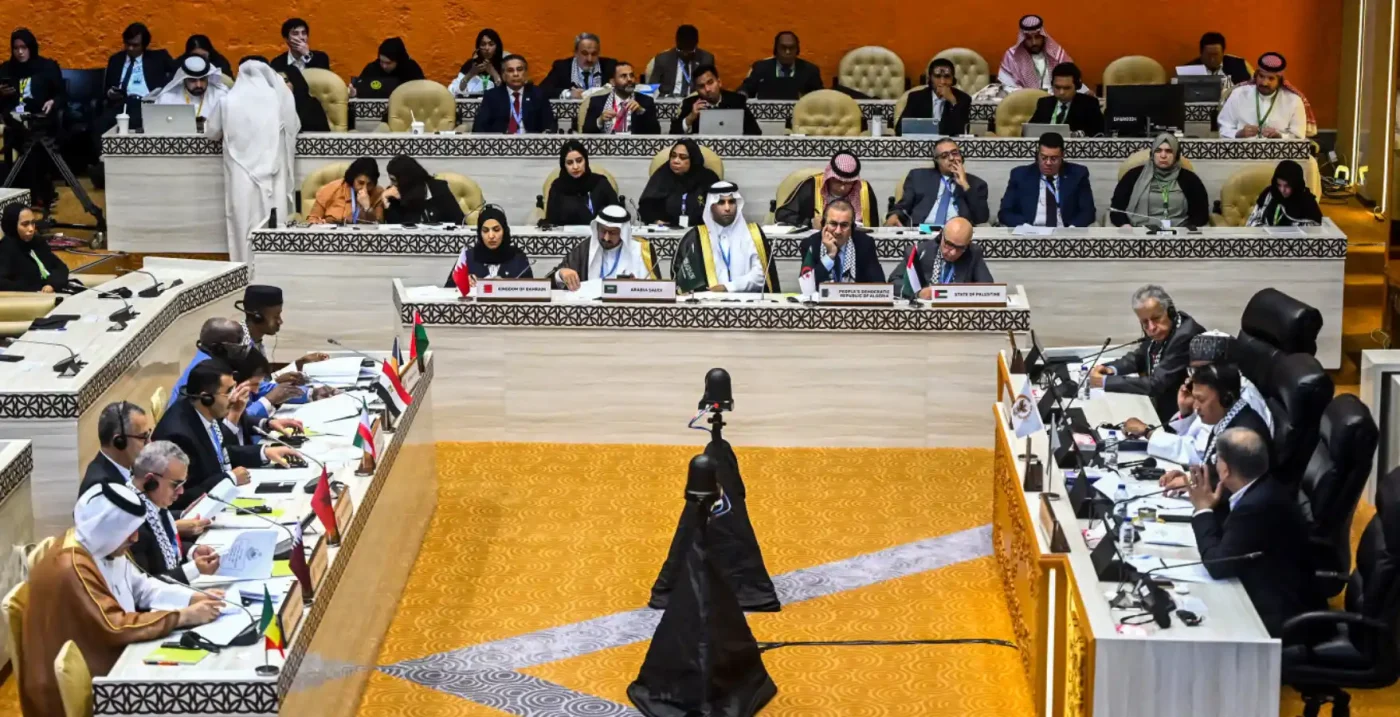Jakarta has become the focal point of international solidarity as legislators from the Organization of Islamic Cooperation (OIC) gathered this week to voice unified support for Palestine. The talks, hosted in Indonesia’s capital, underscored a collective push for global recognition of Palestinian rights amid ongoing conflict. At the same time, Indonesia grapples with domestic challenges, as authorities intensify a nationwide crackdown on gangs and street crime, with thousands arrested in recent sweeps. Together, these developments highlight Jakarta’s dual role as a hub for international diplomacy and a nation addressing pressing internal security concerns.
Unified Stance on Palestine
The OIC meeting in Jakarta brought together parliamentarians from across the Islamic world to address the protracted Israeli-Palestinian conflict. Delegates reiterated their call for an end to violence in Gaza and the West Bank, urging the international community to support Palestinian self-determination. The discussions emphasized the need for humanitarian aid and a renewed push for a two-state solution, with several legislators condemning what they described as systemic violations of Palestinian rights.
Indonesian officials, who have long championed the Palestinian cause, played a central role in facilitating the talks. Foreign ministry representatives stressed Jakarta’s commitment to amplifying the voices of OIC member states on the global stage. “We stand with Palestine not just in words but through persistent diplomatic efforts” said a senior Indonesian diplomat during the opening session. The statement reflects Indonesia’s historical alignment with anti-colonial struggles, a stance that resonates deeply with its domestic audience and fellow OIC nations.
Beyond rhetoric, the Jakarta talks aimed to draft actionable resolutions, including proposals for increased funding for Palestinian refugees and advocacy for stronger UN interventions. While specifics remain under negotiation, the gathering signals a reinvigorated effort to keep the Palestinian issue at the forefront of international discourse, especially as global attention often shifts to other crises. Analysts note that such meetings, while symbolic, can influence policy by fostering coalitions among member states with shared geopolitical interests.
Broader Geopolitical Context
The OIC’s focus on Palestine comes against a backdrop of heightened tensions in the Middle East, where ceasefire agreements remain fragile, and civilian casualties continue to mount. For many OIC legislators, the Jakarta talks represent a platform to counterbalance what they perceive as inadequate responses from Western powers. This sentiment was echoed in public statements calling for sanctions on entities complicit in the occupation of Palestinian territories, though such measures face significant hurdles in international forums.
Indonesia’s role as host also underscores its growing prominence in Islamic diplomacy. As the world’s largest Muslim-majority nation, it wields considerable soft power within the OIC, often bridging divides between member states with divergent political agendas. Yet, some observers caution that domestic priorities—ranging from economic recovery to security challenges—may limit Jakarta’s ability to sustain long-term engagement on international issues like Palestine. Balancing these competing demands will test Indonesia’s diplomatic agility in the coming months.
The talks have not been without criticism. Some activists argue that OIC resolutions often lack enforcement mechanisms, rendering them more performative than impactful. Others point to the organization’s inconsistent track record on human rights issues within member states, questioning the moral authority of its stance on Palestine. Despite these critiques, the Jakarta meeting has succeeded in drawing global media attention to the Palestinian struggle, a key objective for organizers.
Domestic Security Challenges
While Jakarta hosted these high-profile discussions, Indonesia’s law enforcement agencies were simultaneously tackling a surge in domestic crime. Authorities have arrested thousands across the archipelago in a sweeping crackdown on gangs and street crime, an operation that officials say is critical to restoring public safety. The campaign, which spans urban centers like Jakarta and Surabaya as well as rural areas, targets organized crime networks accused of extortion, drug trafficking, and violent assaults.
Police reports indicate that the crackdown has led to the seizure of significant quantities of illegal weapons and narcotics, with several high-profile gang leaders now in custody. “Our streets must be safe for every citizen” said a spokesperson for the National Police during a press briefing. The operation has been met with mixed reactions: while many residents welcome the heightened security presence, others express concern over potential abuses of power, citing past instances of excessive force in similar campaigns.
The timing of the crackdown, coinciding with the OIC talks, has not gone unnoticed. Some analysts suggest that the government may be leveraging the international spotlight to demonstrate its commitment to law and order, a key issue for both domestic voters and foreign investors. Indonesia’s economy, heavily reliant on tourism and trade, suffers when perceptions of instability take root. Addressing street crime, therefore, serves as both a public safety measure and a signal of governance strength.
Public Sentiment and Economic Implications
The dual focus on international solidarity and domestic security has sparked varied responses among Indonesians. In Jakarta, where the OIC talks unfolded, many expressed pride in their country’s role as a diplomatic leader. Street vendors and taxi drivers near the conference venue spoke of the Palestinian cause as a shared struggle, reflecting a widespread empathy rooted in Indonesia’s own history of resisting colonial rule. Yet, conversations often pivoted to local concerns, with rising petty crime cited as a daily burden for small business owners.
Economically, the crackdown on gangs carries both risks and rewards. On one hand, curbing organized crime could bolster investor confidence, particularly in sectors like real estate and retail, which are vulnerable to extortion rackets. On the other hand, heavy-handed policing risks alienating communities already distrustful of state institutions, potentially fueling further unrest. The government faces the delicate task of ensuring that security measures do not exacerbate social inequalities—a challenge made more complex by Indonesia’s vast geographic and cultural diversity.
Moreover, the cost of sustained police operations could strain public budgets at a time when resources are needed for post-pandemic recovery. For instance, funding allocated to crime prevention might divert resources from education or healthcare, sectors still reeling from years of underinvestment. As one Jakarta-based economist noted, “Safety is paramount, but it cannot come at the expense of long-term development.”
Regional and International Ramifications
Indonesia’s domestic policies, particularly on crime, have regional implications as well. Neighboring countries like Malaysia and the Philippines, which also grapple with organized crime, may look to Jakarta’s approach as a model—or a cautionary tale. Cross-border gang networks, often involved in human trafficking and smuggling, require coordinated responses, and Indonesia’s crackdown could prompt greater ASEAN collaboration on security issues. However, without addressing root causes such as poverty and unemployment, such efforts risk being short-lived.
Internationally, the OIC talks in Jakarta reinforce Indonesia’s position as a key player in the Islamic world, potentially strengthening ties with Middle Eastern nations. This could translate into economic benefits, such as increased trade or aid, though it also risks entangling Jakarta in complex regional rivalries. For now, the government appears focused on maintaining a neutral stance, prioritizing humanitarian advocacy over direct involvement in Middle Eastern geopolitics.
Looking Ahead
As the OIC legislators conclude their discussions in Jakarta, the outcomes of their resolutions remain to be seen. Will their calls for Palestinian rights spur tangible action, or will they fade amid the inertia of international politics? Similarly, Indonesia’s crackdown on crime faces scrutiny—can it deliver lasting safety without undermining civil liberties? For now, Jakarta stands at a crossroads, navigating its aspirations as a global advocate while confronting the gritty realities of governance at home. The coming weeks will reveal whether this delicate balance can be sustained.
















